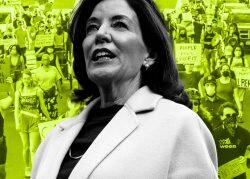Two years ago, outraged members of the real estate industry easily filled a casino conference room in Central New York to vent and strategize.
The Housing Stability and Tenant Protection Act had recently passed, putting a tourniquet on rents in 1 million stabilized apartments. Even upstate, home to just one-10th of the state’s regulated units, landlords were up in arms.
Fast forward to 2021 and that resolve seems like a fever dream. The groups heading the upstate push have withered or gone silent and their leaders have shied from the spotlight. Meanwhile, the need for their organizing has only grown more dire.
Tenant advocates have regenerated some momentum from their 2019 win to push forward another layer of tenant-side protections — good cause eviction, which would prohibit an eviction if an owner hiked rent by more than 3 percent or 150 percent of the inflation rate, whichever is higher. Real estate has condemned the measure as universal rent control.
With little or no opposition from landlords, bills in four municipalities north of New York City have passed in recent months and a fifth is on the table in Ithaca. For industry insiders, the local measures foreshadow consideration of a state bill, which could come to a vote in the 2022 legislative session.
Despite the threat, upstate landlords groups have, by and large, remained silent. Three prominent organizations — Under One Roof NY, New York Capital Region Apartment Association and the Landlord Association of Tompkins County — offered no comment on how or if they plan to combat the push for statewide rent control.
Of those reached, the organizer who divulged the most was Jaime Cain,a Buffalo-area attorney and spokesperson for Under One Roof NY, which formed to amend the good cause eviction bill.
“Right now, there’s no set strategy that I’m able to specifically talk about,” said Cain, who initially declined to comment before agreeing to speak on the record.
The attorney said the groups’ concerns over good cause are the same as they were two years ago.
Read more


Cain said the portion of the good cause bill that prevents evictions if rent is raised above a certain threshold conflicts with state law, which provides for rent regulation only when the vacancy rate exceeds 5 percent.
Because the state law was enacted first and by a higher legislature than local measures, she does not think the good cause bills passed in Newburgh, Albany, Hudson and Poughkeepsie should hold up in court.
The bigger issue for landlords, though, and the reason that little time and few resources have apparently been expended to counter good cause, is the lasting impact of the pandemic, she said.
November marked the 20th month of the statewide eviction moratorium, a measure that has left some owners without rental income from some tenants for the same length of time. Meanwhile, emergency rental assistance has been exhausted, although rent arrears have not.
“That’s the larger concern — whether landlords are going to make it to the end of the year without rent coming in,” Cain said. “There’s no time right now to focus on bills that are not enacted yet.”
For tenant organizers, on the other hand, there is no time like the present to push for eviction protections.
The statewide eviction moratorium is scheduled to end Jan. 15, exposing hundreds of thousands of in-hock tenants to the threat of displacement.
Housing Justice For All, an advocacy group with a base that covers upstate and downstate, launched a campaign this month to pass good cause eviction.
Dubbed #HouseNY, the campaign began with synchronized demonstrations in Hudson Yards, Albany, Buffalo and Rochester. The latter two cities are considering good cause bills of their own.
One reason for the imbalance between landlords’ legwork and tenants’ is money. While advocacy is a full-time job for activists like Housing Justice For All’s Cea Weaver, most landlord organizers outside of the city have taken on that responsibility as an extra-curricular.
Cain is a real estate attorney. Debbie Pusatere, president of the New York Capital Region Apartment Association, which hosted the casino meeting two years back, runs multiple LLCs as an upstate landlord. And Kayla Lane, an outspoken member and the secretary of the Landlord Association of Tompkins County, which encompasses Ithaca, works as a realtor.
Still, the workload of these women does not necessarily explain their absence from good cause fights this year.
After the measure passed in Albany this July, Pusatere told a CBS affiliate that she would take the law to court. This week, when questioned about the NYCRAA’s stance on good cause, Pusatere declined to comment.
Ithaca’s good cause bill will be heard next month. Lane reacted to that news by asking that a working group be assembled to address the issue, the Ithaca Voice reported.
A week later, the Tompkins County landlord group was scheduled to hold its general meeting. Good cause was not among the three items listed on the docket, which included property insurance and 1031 exchanges. Lane did not respond to a request for comment about the omission.
Jay Martin, executive director of the Community Housing Improvement Program, a New York City landlord group, said apart from the lawsuits planned against municipalities that passed good cause, the industry at large is working for a collaborative upstate-downstate push to “inform voters of the potential negative drawbacks” of the bills.
It could diminish the production of affordable housing because its return on investment would be limited, and reduce availability of rentals because tenants could cling to leases indefinitely. Also, some landlords might convert apartments to condos to bypass rent control, further straining supply.
Economists are virtually unanimous on those points. But Martin has little confidence that the legislature will be swayed by them.
“I think the only way that we can be successful is not really focusing on lawmakers, but focusing on voters,” Martin said.
Compounding the tension surrounding good cause is that 2022 is an election year for all state lawmakers.
Gov. Kathy Hochul, who will run for a four-year term next year, has not taken a stance on good cause, but two Democratic rivals — Attorney General Letitia James and New York City Public Advocate Juaane Williams — have endorsed it.
While Martin said he couldn’t speak to upstate landlords’ efforts, or lack thereof, he underscored his confidence that door-knocking could draw support for real estate’s platform.
“When you ask anyone if they want to pay less rent — even I’m a renter; of course I want to pay less rent,” Martin said. “But we know it to be a near certain fact that if this law is to pass, the production of housing will be diminished.”
“So I think that’s an important message that must get to voters before lawmakers pick up this bill.”
